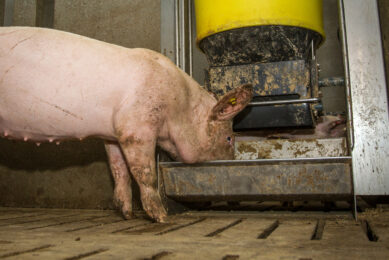US: Modified diet may increase pig birthrate
New research, funded by USDA, shows that prenatal death and fetus growth restriction in pigs can be minimised by dietary adjustments that can enhance placental growth, thereby promoting an optimal intrauterine environment throughout pregnancy.
The widespread practice of restricted feeding programmes to prevent excessive weight gain of sows during pregnancy may result in increased death and reduced growth of fetuses. Sows may also not receive sufficient amounts of certain nutrients during mid- to late-gestation when a restricted feeding programme is used.
Arginine
These problems could be greatly reduced by supplementing standard corn and soybean-based maternal diets with an additional 0.83 percent arginine between days 30 and 114 of gestation, according to the researchers Guoyao Wu, Sung Woo Kim and colleagues that conducted studies that were funded by the USDA’s Cooperative State Research, Education, and Extension Service.
Economic return
Compared to the control sows that received no additional arginine, the additional supplementation increased the number and total litter weight of piglets born alive by two per litter and 24%, respectively. The study shows that a specific dietary intervention can enhance reproductive performance in pigs.
This recent discovery may result in a significant economic return to pork producers. An increase in the number of live-born pigs will markedly reduce the production costs associated with sow reproduction and lactation. An increase in the vitality of newborn pigs will increase their rate of survival to weaning.
Related website:
• USDA’s Cooperative State Research, Education, and Extension











